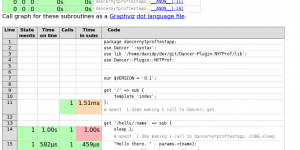We have an IRC bot in the #dancer IRC channel powered by Bot::BasicBot::Pluggable, and I recently wrote some new features as a distribution of modules which I plan to release to CPAN soon.
Until then, you can see the code in the Bot::BasicBot::Pluggable::Module::GitHub repository on GitHub.
There are two modules so far:
EasyLinks
Bot::BasicBot::Pluggable::Module::GitHub::EasyLinks recognises certain elements within discussions on IRC and provides responses containing titles/URLs to see the corresponding entity, for instance:
<someuser> I'm just working on Issue 42 now
<bot> Issue 42 (Issue Title - Issues - sukria/Dancer - GitHub) - https://github.com/user/project/issues/42
<someuser> I've just submitted PR 517, anyone want to merge it?
<bot> Pull request 517 (Pull request title - Pull Request - GitHub) - https://github.com/user/project/pull/517
<someuser> What do you think of commit 0d2752 then?
<bot> Commit 0d2752 (Commit message summary here) - https://github.com/user/project/commit/0d2752...
PullRequests
Responds to a !pr command, reporting the number of open pull requests, either for whatever project is specified as the default for that channel, or a specific project can be named. For instance:
<someuser> !pr user/project
<bot> Open pull requests for user/project : 5 pull requests open (usera:3, userb:2)
I plan to add more features before releasing the first version to CPAN; in particular, I’d like to add commit hook support, so the module could spawn a trivial webserver to listen for hook triggers from GitHub, and announce commits.
As always, contributions would be welcomed.


